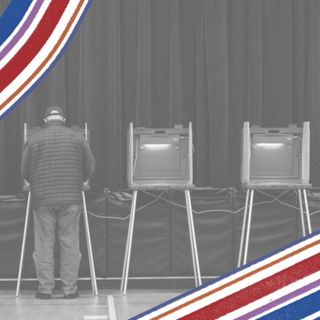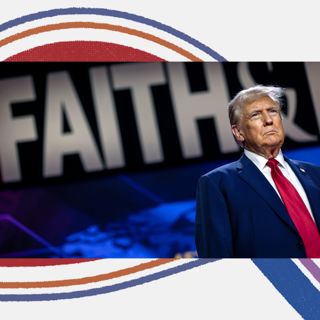
What Evangelicals Think of Trump's Abortion Flip-Flop
Former president Trump frequently takes credit for helping to overturn Roe v. Wade.But in recent weeks, he has posted on Truth Social, his social media site, that his administration would be “great for women and their reproductive rights.” He suggested that he might vote for a Florida ballot measure allowing abortion up to around 24 weeks, before reversing his position. And he floated the idea that under a Trump administration, in vitro fertilization treatments would be covered by insurance companies or the federal government.With these shifting messages, Donald Trump is basically daring anti-abortion voters to turn on him. So will they?On this week’s show, we check in with Dr. R. Albert Mohler Jr., president of the Southern Baptist Theological Seminary and a leading voice for American evangelicals, to find out.On today’s episodeDr. R. Albert Mohler Jr., president of the Southern Baptist Theological Seminary in Louisville, Ky. Listen to an earlier conversation with Dr. Mohler on “The Run-Up” here. Subscribe today at nytimes.com/podcasts or on Apple Podcasts and Spotify. You can also subscribe via your favorite podcast app here https://www.nytimes.com/activate-access/audio?source=podcatcher. For more podcasts and narrated articles, download The New York Times app at nytimes.com/app.
5 Sep 202431min

The Grocery Bills That Could Decide the Election
This election, like a lot of elections before it, may come down to which candidate voters think might help them with their grocery bills and housing costs — the essential stuff of everyday economics.That’s what people around the country say — and what they tell pollsters too.But the fact that life feels expensive right now is not just something voters are talking about.Campaigns are too.Kamala Harris just released an ad focused on how hard it is to own a home in the United States and an economic policy aimed at curbing prices. And Donald Trump has been on the trail touting his economic record.So, this week on “The Run-Up,” we spend time talking with people who feel the economy is not working for them — and talking to Jason DeParle, who covers poverty for The New York Times, about how the candidates say they’ll help the poorest Americans.On today’s episodeJason DeParle, who writes about poverty in the United States for The New York Times. Subscribe today at nytimes.com/podcasts or on Apple Podcasts and Spotify. You can also subscribe via your favorite podcast app here https://www.nytimes.com/activate-access/audio?source=podcatcher. For more podcasts and narrated articles, download The New York Times app at nytimes.com/app.
29 Aug 202433min

The Defining Moments of the D.N.C. Finale
On the final night of the Democratic National Convention, Vice President Kamala Harris took the stage and formally accepted her party’s nomination.After the balloons fell, Astead Herndon and his colleagues Maya King and Jennifer Medina broke down the moments that stood out to them from the night — from people touched by gun violence telling their stories to the way Ms. Harris talked about Israel and the war in Gaza to how she told her own story. Plus, there was the rumored special guest who never materialized. On today’s episode:Maya King, a politics reporter for The New York TimesJennifer Medina, a politics reporter for The New York Times Subscribe today at nytimes.com/podcasts or on Apple Podcasts and Spotify. You can also subscribe via your favorite podcast app here https://www.nytimes.com/activate-access/audio?source=podcatcher. For more podcasts and narrated articles, download The New York Times app at nytimes.com/app.
23 Aug 202425min
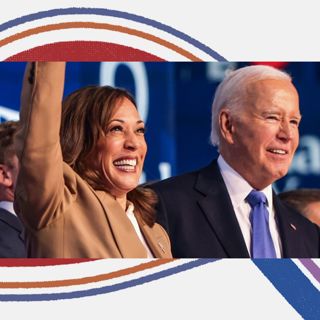
It’s Kamala Harris’s Party Now. What’s Different?
Vice President Kamala Harris speaks at the Democratic National Convention tonight, formalizing her rapid ascent to the top of the Democratic ticket and capping a very unusual path to the nomination.No primary. No serious opposition. No real robust sense of what her legislative priorities might be.On today’s show, a quest to answer this question: Is a Harris-led Democratic Party substantively different than the Democratic Party of Joe Biden?As they all gathered in Chicago, we put that question to Senator Elizabeth Warren of Massachusetts, Shawn Fain, the president of the United Auto Workers union — and the man hosting Democrats in his town, Chicago mayor Brandon Johnson. Subscribe today at nytimes.com/podcasts or on Apple Podcasts and Spotify. You can also subscribe via your favorite podcast app here https://www.nytimes.com/activate-access/audio?source=podcatcher. For more podcasts and narrated articles, download The New York Times app at nytimes.com/app.
22 Aug 202435min

How Gaza Is Showing Up in Chicago
After two days of the Democratic National Convention, one thing is clear.Democrats are united behind their new nominee.And Kamala Harris has those in the Democratic Party, from the high-profile speakers to the delegates in the hall, thinking they can win.In fact, the unity is such that after months of worrying about whether the convention would be upended by protests over Israel’s war in Gaza, so far, things feel quiet.But does anger over foreign policy still pose an electoral threat?On today’s show, a conversation with Abbas Alawieh, an uncommitted delegate from Michigan, and people who came to Chicago to protest. Subscribe today at nytimes.com/podcasts or on Apple Podcasts and Spotify. You can also subscribe via your favorite podcast app here https://www.nytimes.com/activate-access/audio?source=podcatcher. For more podcasts and narrated articles, download The New York Times app at nytimes.com/app.
21 Aug 202428min

The Democrats Throw Joe Biden a Goodbye Party
Last night, thousands of people gathered in Chicago for the first night of the Democratic National Convention. And the crowd at the United Center was ready for a party.The evening featured a cameo from their candidate, Vice President Kamala Harris, and speeches from Representative Alexandria Ocasio-Cortez, former Secretary of State Hillary Clinton and, closing out the night, President Biden.Before he could begin his speech, he received a sustained round of applause — more than four minutes long.It was just one memorable moment over the course of an evening that was both a goodbye party and kickoff event.The Run-Up is coming to you from the D.N.C. all week.Today: Night One in Chicago, where the Democrats attempted to reclaim a certain expression of patriotism, and gave thanks to Mr. Biden.On today’s episode:Reid Epstein, a politics correspondent for The New York Times. Subscribe today at nytimes.com/podcasts or on Apple Podcasts and Spotify. You can also subscribe via your favorite podcast app here https://www.nytimes.com/activate-access/audio?source=podcatcher. For more podcasts and narrated articles, download The New York Times app at nytimes.com/app.
20 Aug 202417min
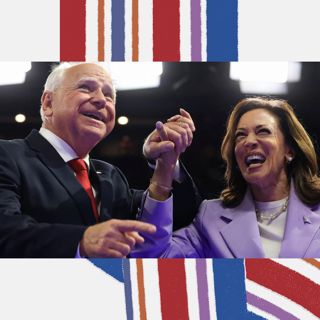
An Insider’s Guide to the D.N.C.
The Democratic National Convention kicks off in Chicago today, less than a month after Democrats changed their nominee in a remarkable political shake-up. To get set for the week, “The Run-Up” talks with Leah Daughtry, an at-large member of the Democratic National Committee, the chief executive of the 2008 and 2016 Democratic National Conventions and a co-chair of the convention rules committee, an incredibly significant role this year given the nominee switch.She is the ultimate Democratic Party insider. And she is also remarkably candid and straightforward, particularly when it comes to providing insight on how party leaders make decisions.Today, a conversation with Ms. Daughtry about how the Democratic Party got to this unusual moment — and what to expect from the convention. Subscribe today at nytimes.com/podcasts or on Apple Podcasts and Spotify. You can also subscribe via your favorite podcast app here https://www.nytimes.com/activate-access/audio?source=podcatcher. For more podcasts and narrated articles, download The New York Times app at nytimes.com/app.
19 Aug 202431min
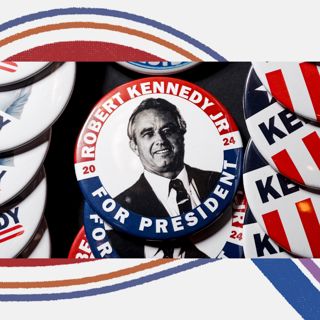
Has RFK Jr.'s Moment Passed?
For much of the 2024 presidential election, it felt like there were pretty ideal conditions for a third-party candidate. Republicans and Democrats had both lined up behind broadly unpopular — and familiar — candidates. In the spring, Robert F. Kennedy Jr. was polling at 10 percent in The New York Times/Siena College survey of battleground states, and sustained interest in his candidacy was enough to raise alarm among his major-party rivals.As that alarm grew, the Run-Up team traveled to Royal Oak, Mich., for a Kennedy campaign event to ask people how they were thinking about a third-party vote when the stakes for that decision were so high.Since that visit, a lot has changed in the race. There’s a new name on top of the Democratic ticket. And a lot has changed in Mr. Kennedy’s campaign, too. But third-party interest among voters who are sick of the system or wary of both parties remains.On today’s show: what made RFK Jr. such a threatening spoiler — and how the RFK-curious in a crucial state are thinking about the race now.For more on RFK Jr., listen to Astead's interview with the candidate in March. Subscribe today at nytimes.com/podcasts or on Apple Podcasts and Spotify. You can also subscribe via your favorite podcast app here https://www.nytimes.com/activate-access/audio?source=podcatcher. For more podcasts and narrated articles, download The New York Times app at nytimes.com/app.
15 Aug 202438min
